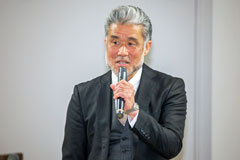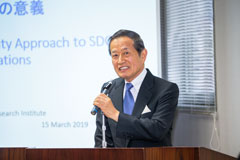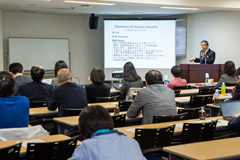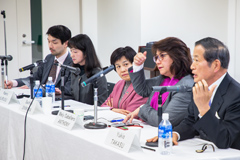Symposium Participants Discuss 'the Current Significance of Human Security in Achieving the Sustainable Development Goals'
2019.04.24
The symposium "The Current Significance of Human Security in Achieving the Sustainable Development Goals" was held at the JICA Ichigaya Building in Tokyo on March 15, 2019.
It has been 25 years since the concept of human security was introduced in the Human Development Report by the United Nations Development Programme (UNDP) in 1994, and it has been the subject of various discussions in various places ever since. And since the 2030 Agenda for Sustainable Development was adopted, the usefulness of the philosophy and approach of human security has been getting renewed attention when discussing how to realize a society in which "no one will be left behind," a principle of the agenda, and how to cope with risks to achieving the Sustainable Development Goals (SDGs).
At the beginning of the symposium, Dr. Takao Toda, a vice president at JICA, gave opening remarks. The basic concept of human security has its origins in U.S. President Franklin Delano Roosevelt's 1941 State of the Union address (the Four Freedoms speech) and the Atlantic Charter that was influenced by it, he said. The situation of globalization advancing irreversibly in modern societies while the principle of putting one’s own country first gains prevalence is, if anything, an opportunity to return to the starting point of human security, Dr. Toda said. He added that since Japan cannot survive except in symbiosis with the international community, he would like to gain from the symposium the expertise needed to think about what international cooperation practitioners should do to materialize a concept that underlies the international community.

Dr. Takao Toda, a vice president at JICA, gave opening remarks
Next, His Excellency Mr. Yukio Takasu, Special Advisor to the Secretary-General of the United Nations, gave a keynote speech. He emphasized that Japan’s human-centered and comprehensive initiative of human security played a significant role in developing initially the Millennium Development Goals (MDGs), and further expanding them into the 2030 Agenda and the SDGs, which are characterized by universality and comprehensiveness. He then explained that in order to realize the ultimate objective of the 2030 Agenda, a society in which "no one will be left behind," it is essential to secure human security (life, livelihood and dignity) for all and we must aim for a society in which everyone has equal opportunity to live a life worthy of a human being. Pointing out that even in a developed county like Japan, which is achieving most of the SDGs targets, the reality is far from a society where no one is left behind, he introduced the Human Security Indicators of Japan, which were compiled to identify visually who, where and how people are being left behind.

His Excellency Mr. Yukio Takasu, Special Advisor to the Secretary-General of the United Nations, gave a keynote speech
Dr. Mely Caballero-Anthony, professor of International Relations and Head of the Centre for Non-Traditional Security Studies, Nanyang Technological University, Singapore, pointed out that while transnational connectedness is increasing through globalization, we are also being exposed to problems that transcend national boundaries. Dr. Caballero-Anthony identified climate change as the major threat to human security in Southeast Asia and elaborated on the case of vulnerable women and children that suffered from natural disasters and the danger of falling prey to human trafficking. In this sense, to increase resilience to crises in human security, she emphasized, a multilateral approach by not just nations, but also various actors including civil society groups, NGOs and local communities, is increasingly important.
Dr. Sachiko Ishikawa, senior advisor at JICA, gave a presentation on how JICA has tried to put the concept of human security into practice in the Philippines during the peace process between the Philippine government and the Moro Islamic Liberation Front in Mindanao. The case she introduced was based on the results of the JICA Research Institute project "Human Security in Practice: East Asian Experiences." Dr. Ishikawa mentioned three lessons learned through the project: 1. International emergency assistance tends to be accepted smoothly only when mutual trust has been consolidated in peacetime. 2. Horizontal coordination between stakeholders is not an end in itself; vertical communication to listen to grassroots voices matters. And 3. Practitioners should consider the following sequence: Speedy protection and resurgence of empowerment. She introduced these lessons, mixing in specific episodes. The book "Human Security and Cross-Border Cooperation in East Asia," published by JICA-RI, covers the Mindanao case in detail.

The symposium brought together delegates from government and international organizations, researchers and practitioners
At the start of the panel discussion that followed the presentations, Dr. Kaoru Kurusu, professor of international relations, Kobe University, and president at the Japan Association for Human Security Studies, presented the theoretical assumption that human security underpins human development. After introducing in chronological order the trends in academia related to human security, she suggested that human security has become established more firmly than expected in the fields of education and research.

Members of the panel responded to questions from the audience
A lively discussion then took place among the panelists on the challenges in realizing a society in which "no one will be left behind" from the viewpoint of human security, and the value added by human security even when some states do not consider the concept of human security.
In her closing remarks, JICA-RI Director Izumi Ohno concluded the symposium by saying, "We would like to continue research that is useful in the practice of human security."

事業事前評価表(地球規模課題対応国際科学技術協力(SATREPS)).国際協力機構 地球環境部 . 防災第一チーム. 1.案件名.国 名: フィリピン共和国.

事業事前評価表(地球規模課題対応国際科学技術協力(SATREPS)).国際協力機構 地球環境部 . 防災第一チーム. 1.案件名.国 名: フィリピン共和国.

事業事前評価表(地球規模課題対応国際科学技術協力(SATREPS)).国際協力機構 地球環境部 . 防災第一チーム. 1.案件名.国 名: フィリピン共和国.

事業事前評価表(地球規模課題対応国際科学技術協力(SATREPS)).国際協力機構 地球環境部 . 防災第一チーム. 1.案件名.国 名: フィリピン共和国.

事業事前評価表(地球規模課題対応国際科学技術協力(SATREPS)).国際協力機構 地球環境部 . 防災第一チーム. 1.案件名.国 名: フィリピン共和国.
scroll